About Fitch's Pharmacy
Fitch's Pharmacy is a small independent pharmacy located in the Hay Street Mall Perth Western Australia. Fitch's Pharmacy has been in business for over 70 years serving the Perth community. Fitch's Pharmacy continues to sell a huge range of natural remedies as well as all of the well known pharmaceutical lines.
Contact Details
731 Hay Street Mall
Perth, WA 6000
Phone : 08 9321 6411
Fax: 08 9321 1920
Email:info@fitchs.com.au
Opening Hours
Mon - Fri - 6am to 7pm
Sat 9am to 5pm
Sun - 12pm to 5pm
Who was Mr Fitch?
Harry Duncan Fitch was born in Kalgoorlie on 28 February 1904 and moved to Subiaco in 1907 when his father, a WAGR signalman, was transferred to Perth. Harry was apprenticed to Harry Sandercock, a Subiaco pharmacist, graduating in December 1924 which posed problems for him. A law, ‘the Poison’s Act’, prevented him from being fully operational as a qualified pharmacist until he was 21 years of age. Soon after qualifying, he travelled to Victoria to gain experience. However less than a year later, Sandercock offered him a partnership in his Rokeby Road pharmacy that he had commenced in 1913.
In 1935, Harry Fitch dissolved the partnership as he desired to open his own business. He purchased Barclay’s pharmacy on the corner of Hay and William Streets Perth. This was ideally located at a tram stop on the line to West Perth, Subiaco and Nedlands and at a time when most medical specialists had their consulting rooms in St George’s Terrace, west of William Street. Many who travelled by train would walk up William Street from St George’s Terrace to the Perth railway station and pass the pharmacy. It was reported Barclay’s primary interest had been in developing new remedies such as mixtures for colds, flu and indigestion and corn and wart cures. These products, named after Barclay, were effective at that time and continued to be manufactured and sold at Fitch’s pharmacy even after the Second World War. In the history of pharmacy in WA, there is no mention of either Barclay or his pharmacy1.
On 1st August 1935, Harry opened Fitch’s Day and Night Chemists with a pharmacist sleeping each night on the premises. At that time, Gledden Buildings owned by the University of WA (UWA) was a two storey building.
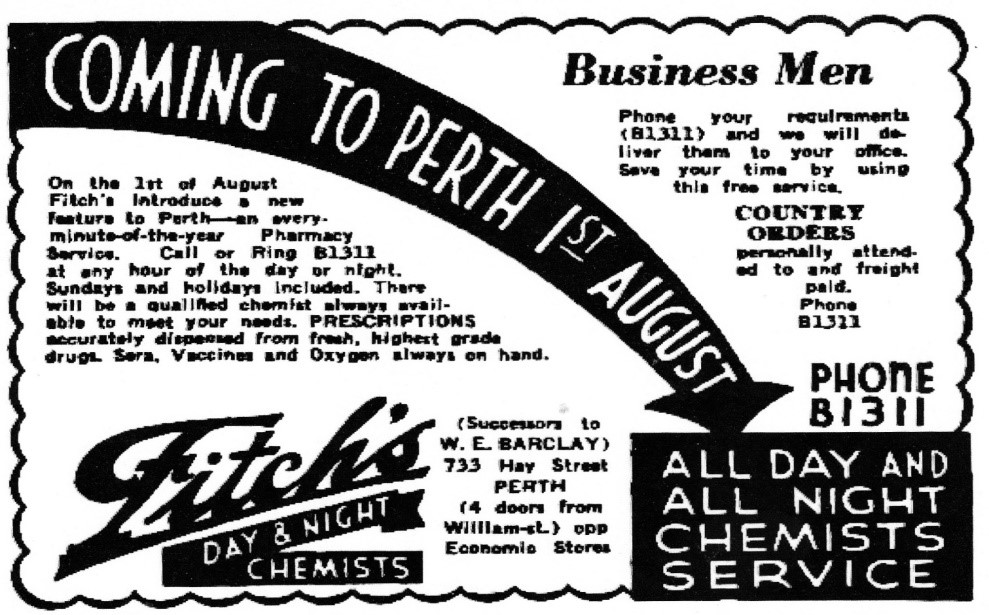
The West Australian 1st August 1935
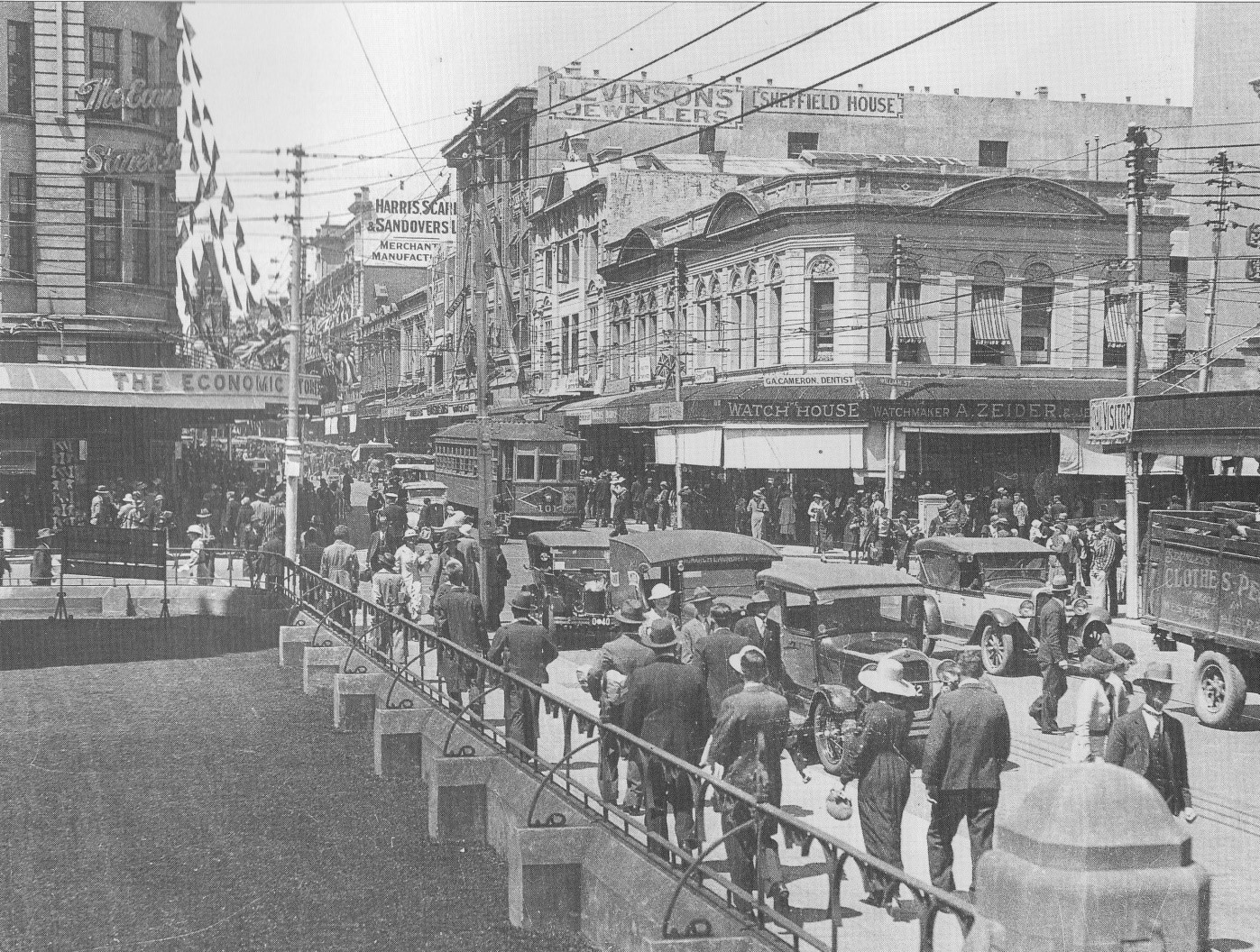
First (pre 1937) Gledden building – Fitch’s Pharmacy is to the right of the tram
It would have been both a shock and distressing to Harry when UWA decided to demolish this building and replace it with a seven storey art deco building, allegedly the tallest building in Perth at that time. From March 1937 to May 1938, Fitch’s pharmacy had to relocate to Central Arcade and I suspect that in the period, the pharmacy was renamed a ‘daily to midnight’ chemist.
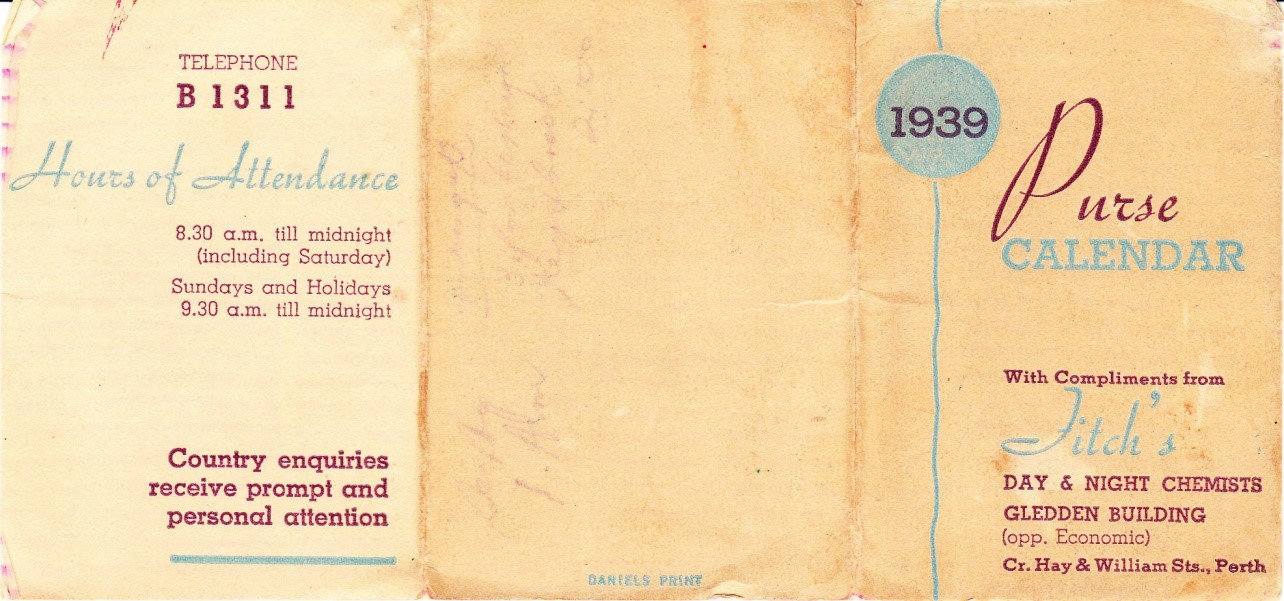
An old Purse Calendar
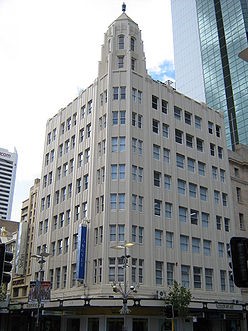
The new Gledden Building
When war began in 1939, many pharmacists enlisted including some from Fitch’s and the opening hours were severely reduced to 0830 – 1730 on weekdays, 0900 – 1300 on Saturdays and from 1830 – 2000 on Saturdays and Sundays. This continued until Harry ceased work in December 1956.
In 1938, Harry joined the Army Reserve (militia) as the field ambulance needed a pharmacist. But it was August 1940, 11 months after war was declared, before Harry joined the regular Army. As a master chemist, he would have been manpowered as many other men were. When he did enlist, he opted not to do so as a pharmacist but as a sergeant in the 2/7th Field Ambulance, rising almost immediately to lieutenant and six months later to captain, the unit quartermaster. He was not demobilised until November 1945 although as a master chemist, he was allowed to return to work in the pharmacy a month or two before that time.
Post war, Harry resumed work in his beloved pharmacy and in pharmacy politics and administration. He was active in the WA Pharmacy Guild pre and post war serving as Treasurer and also as Vice President and at the time of his death, was Chair of the WA Branch of the Pharmacy Defence Limited. For many years, he was an examiner in dispensing for final year pharmacy students. But it was only post war that he became involved in the WA Pharmacy Council, being a member 1946-1957 and President 1950-1954. As President, he represented WA on the Pharmaceutical Association of Australia and at the time of his death, was the Association’s deputy President and President-elect. He was due to become President in May 1957 but unfortunately his premature death denied him assuming this office; he would have been the first Western Australian to achieve the Presidency.
Harry was on pre-embarkation leave and about to leave for the Middle East when his manager resigned to join the Australian forces. As Harry, a master chemist, was not an Army pharmacist, he was manpowered until he could obtain a new manager. This may have cost him his life because the 2/7th Field Ambulance served in campaigns in Greece and Crete where the unit was captured by the Germans and spent the remainder of the war as POWs of the Germans. Harry soon found a new manager but the 2/7th’s ship had already left Fremantle. He was transferred to the 2/13th Field Ambulance and served with them for the rest of World War 2. In 1943, while his unit was serving in the tropics, unaccustomed sun exposure led to a malignant melanoma. This was managed successfully by extensive surgery and radiotherapy allowing him to return to active service including the allied invasion of Borneo in 1945. Sadly, in late November 1956, his melanoma recurred and he was given 3 months to live. To provide for his wife and family, immediately he sold his beloved pharmacy to Ian Sinclair who also owned the Baird’s pharmacy. Both Harry’s sons had chosen a career in medicine rather than pharmacy but rather than being disappointed about not having a pharmacist-son to carry on his business, Harry was delighted because he would have loved to have been a doctor but family circumstances did not permit this. He died less than the predicted three months later - on 5th February 1957.
Shortly prior to his death, terminally ill and hospitalised, Harry contacted UWA and received permission from Vice Chancellor Prescott for money to be raised in lieu of floral tributes and to be placed in a melanoma and cancer fund to be used for research into both conditions at the ‘infant’ Medical School of Western Australia. A large sum of money was raised. Although not uncommon today, this action by Harry Fitch was extremely rare in 1957. However, my father’s army unit – the 2/13th Field Ambulance - declined to be involved and wished to establish their own ‘memorial’ to him. Hence, it was Harry’s army unit that raised the money and established a prize in pathology in the new WA Medical School. It continues today. Sadly, Harry did not live to see his younger son Neil graduate in medicine in 1959, in the first group of medical students to graduate with a MB BS (UWA).
My father was a remarkable man but don’t take my word for it. This is an obituary about which I became aware only after my mother died in 1993. It was from the Australian Journal of Pharmacy edition 28 February 1957 – ironically what would have been his 53rd birthday.
With the passing of Harry Duncan Fitch on 5 February 1957, Australian Pharmacy lost one of its most loved leaders. Of no man could it be said more truly that he fulfilled every office which he held with dignity, grace and efficiency. To meet him was a joy and to have been associated with him in any undertaking an enriching experience, not to be forgotten. Towards the end of his life, with the knowledge that but a short time remained, he demonstrated those deep qualities of character which marked him as a man among men.
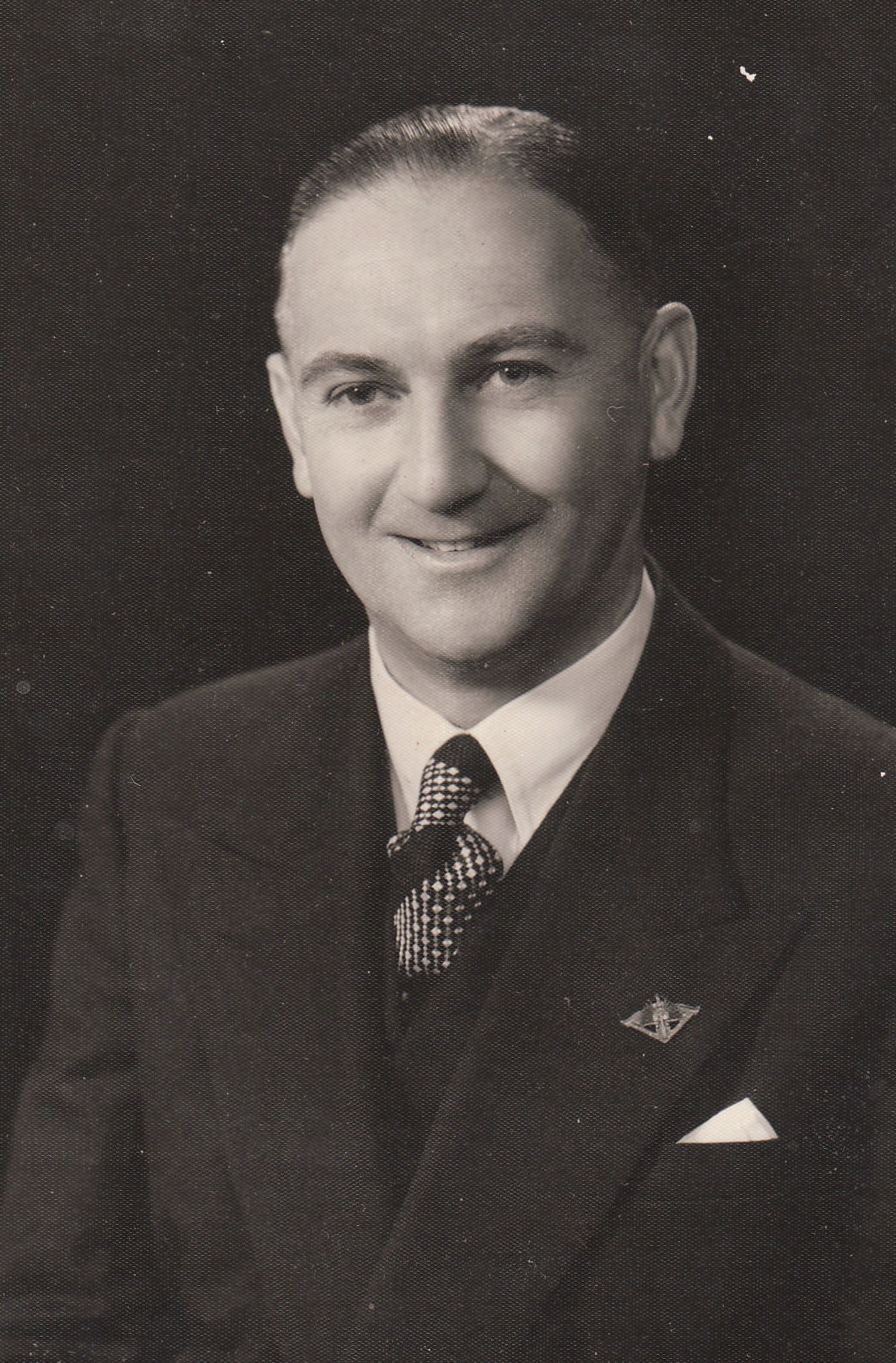
Harry Fitch


Validate your login
Sign In
Create New Account